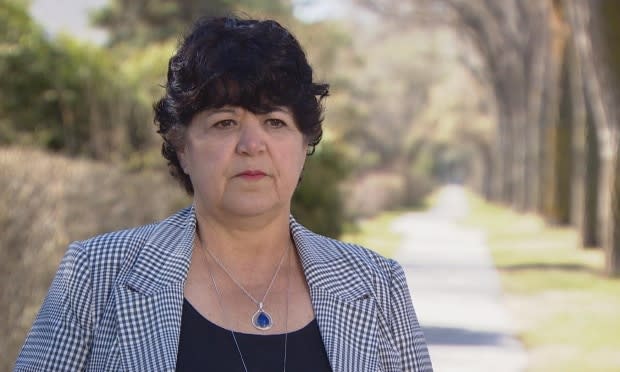AHS wants care home workers reporting to multiple sites in Vegreville during pandemic
Unable to recruit enough workers, Alberta Health Services wants four Vegreville care homes exempted from a public health order limiting employees to one site.
"At this time it is not possible, despite recruitment efforts and exhausting all alternative options, to limit staff who work at multiple sites to work at only a single site," said Kerry Williamson, Alberta Health Services (AHS) spokesperson, in a Friday email. "We must have appropriate staffing coverage at each site to continue to provide safe and quality care."
Alberta's chief medical officer of health, Dr. Deena Hinshaw, ordered all long-term care homes and supported living facilities in the province to limit employees and contractors to working in just one facility during the current public health emergency.
The move was supposed to prevent spread of the virus that causes COVID-19 between settings where residents are especially vulnerable to the illness.
Eight smaller homes are still not in compliance with the order, the health minister's press secretary said Friday.
The limitation created logistical challenges, as thousands of workers have part time or casual jobs in two or more locations.
Leaders of unions representing some of the workers say the patchwork of public, non-profit, faith-based and for-profit homes is a flawed system reliant on underpaid workers -- many of who are women and immigrants.
They say the scramble to reorganize more than 40,000 workers into the equivalent of full-time jobs would be unnecessary if workers were paid uniform, fair wages and granted consistent hours.
Trouble in Vegreville
Sandra Azocar, executive director of Edmonton-based Friends of Medicare, said it's no coincidence there's a shortage of continuing care workers in Vegreville. The town east of Edmonton was in the news last fall when the Century Park care home was sold to new owners.
Vancouver-based owner Optima Living laid off more than 50 workers and contracted nursing care and kitchen operations there to a third party.

They offered employees work again — for $8 an hour less than they were previously earning. A letter to workers said the decision would offer "a greater return to our shareholders."
Azocar said it's difficult to recruit and retain employees with low wages.
"This is valuable work," she said Friday. "They're working directly with our loved ones. And yet we have never, up until now, taken a real look and stock of the value of the work that they do."
Guy Smith, president of the Alberta Union of Provincial Employees (AUPE), said the exemption application was necessary because of chronic under staffing.
AUPE represents more than 17,000 long-term care employees, including those working at the Vegreville sites.
"Now, more than ever we need the government to make employers to fill these gaps properly and safely — not let them off the hook by simply granting exemptions to agreements and leaving rural Alberta to suffer," Smith said in a Friday statement.
He said the government is attempting to assemble a "puzzle that's missing pieces." Workers fill the gaps by taking on multiple jobs, he said.
AHS runs one of the four care homes in Vegreville, and pays private operators to run the other three, including Century Park.
If Hinshaw approves the exemption — which she hasn't, yet — the facilities will take "extensive measures" to prevent coronavirus from spreading, Williamson said.
Workers will have to change clothes between the sites, pass rigorous screening when entering the buildings and avoid working at more than one site on the same day, when possible, he said.
Recruitment is ongoing in the area, he said. AHS is trying to train new workers while trying to attract veteran staff.
Alberta Health spokesperson Tom McMillan said Friday the Vegreville request is the only potential exemption Hinshaw's office is aware of, and that no exemptions have yet been granted.
Hinshaw said Friday the order was applied to continuing care homes and supported living workers because evidence suggested workers travelling between these locations presented the greatest risk of disease spread.
The elderly are particularly susceptible to serious illness and death from COVID-19.
Of the 143 Albertans who had died from COVID-19 as of Friday, 108 of them lived in seniors' residences or care homes.
Order with no start date
Although Hinshaw's one-site order took effect more than a month ago, its official start date is "as soon as possible."
In the legislature on Wednesday, Health Minister Tyler Shandro said, as far as he knew, 100 per cent of Alberta long-term care workers were complying.

On Thursday, Canadian Union of Public Employees Alberta president Rory Gill expressed doubt that was the case.
On Friday evening, Shandro's press secretary, Steve Buick, said 98 per cent of the nearly 400 facilities in Alberta have workers dedicated to one site.
Eight small sites are not in compliance with Hinshaw's order, he said, because of staff shortages. Hinshaw will consider exempting them if they can take extra infection control measures, he said.
Buick said the government believes the mix of different types of long-term care providers makes the system stronger. He said generally, the system has done a good job managing the unprecedented crisis compared to some other jurisdictions.
Gill said while many employers are following a related order from the labour minister to grant part-time workers the equivalent of full-time hours, some are not.
Gill said a further problem with the one-site order is that long-term care workers can still take additional jobs in hospitals or in fast-food restaurants — jobs where they may come into contact with hundreds of people.
"We know how endangered they are by this virus," Gill said. "Our staff, our members, know this, too. But they have to put food on the table, so the province has to step in with subsidies."
A $2 hourly wage top-up for health-care aides — which has also been delayed for some workers — doesn't solve the problem, he said.
Although health orders are subject to adjustment, Hinshaw said on Friday that limiting the one-site rule to seniors' and long-term care homes appears to have been effective in preventing outbreaks there. "We do encourage workers to focus, again, the time they work as much as possible at that single long-term care site," she said.


